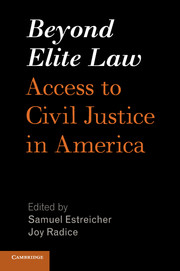Book contents
- Frontmatter
- Contents
- Beyond Elite Law
- Foreword
- List of Contributors
- Overview
- Overview
- PART I CURRENT STATE OF ACCESS TO LEGAL SERVICES
- PART II SOURCES OF LEGAL SERVICES ASSISTANCE FOR WORKING AMERICANS
- PART III FASHIONING A REFORM AGENDA
- 23 New York State Task Force to Expand Access to Civil Legal Services
- 24 New York's 50-hour Pro Bono Requirement
- 25 Starting a “Low Bono” Law Practice
- 26 Toward a More Effective and Accessible Solo and Small Firm Practice Model
- 27 Facilitating Homemade Wills
- 28 Court Facilitation of Self-Representation
- 29 Limited Representation and Ethical Challenges
- 30 Technology Can Solve Much of America's Access to Justice Problem, If We Let It
- 31 Mediation of Employment Disputes at the EEOC
- 32 AAA Consumer Arbitration
- 33 Saturns for Rickshaws: Lessons for Consumer Arbitration and Access to Justice
- 34 Employment Arbitration in the Securities Industry
- 35 FINRA Arbitration and Employment Disputes
- 36 Arbitration as an Employee-Friendly Forum
- 37 Access to Justice in Employment Arbitration: a Critical Look
- 38 Collaborative Technology Improves Access to Justice
- 39 Union Representation in Employment Arbitration
- 40 Legal Representation for New York City's Chinese Immigrant Workers
- 41 Reassessing Unauthorized Practice of Law Rules
- 42 The Pyett Protocol: Collectively-Bargained Grievance Arbitration as a Forum for Individual Statutory Employment Claims
- PART IV CREATING A CULTURE OF SERVICE
- Index
31 - Mediation of Employment Disputes at the EEOC
from PART III - FASHIONING A REFORM AGENDA
Published online by Cambridge University Press: 05 May 2016
- Frontmatter
- Contents
- Beyond Elite Law
- Foreword
- List of Contributors
- Overview
- Overview
- PART I CURRENT STATE OF ACCESS TO LEGAL SERVICES
- PART II SOURCES OF LEGAL SERVICES ASSISTANCE FOR WORKING AMERICANS
- PART III FASHIONING A REFORM AGENDA
- 23 New York State Task Force to Expand Access to Civil Legal Services
- 24 New York's 50-hour Pro Bono Requirement
- 25 Starting a “Low Bono” Law Practice
- 26 Toward a More Effective and Accessible Solo and Small Firm Practice Model
- 27 Facilitating Homemade Wills
- 28 Court Facilitation of Self-Representation
- 29 Limited Representation and Ethical Challenges
- 30 Technology Can Solve Much of America's Access to Justice Problem, If We Let It
- 31 Mediation of Employment Disputes at the EEOC
- 32 AAA Consumer Arbitration
- 33 Saturns for Rickshaws: Lessons for Consumer Arbitration and Access to Justice
- 34 Employment Arbitration in the Securities Industry
- 35 FINRA Arbitration and Employment Disputes
- 36 Arbitration as an Employee-Friendly Forum
- 37 Access to Justice in Employment Arbitration: a Critical Look
- 38 Collaborative Technology Improves Access to Justice
- 39 Union Representation in Employment Arbitration
- 40 Legal Representation for New York City's Chinese Immigrant Workers
- 41 Reassessing Unauthorized Practice of Law Rules
- 42 The Pyett Protocol: Collectively-Bargained Grievance Arbitration as a Forum for Individual Statutory Employment Claims
- PART IV CREATING A CULTURE OF SERVICE
- Index
Summary
Mediation is often suggested as an important mechanism for resolving disputes without the costs, financial and psychological, of litigation. The Equal Employment Opportunity Commission (EEOC), a federal agency responsible for the major federal employment discrimination laws, developed a mediation program to help resolve charges that neither the agency nor private lawyers are likely to take on in litigation. The California Department of Fair Employment and Housing (CHFEH) also mediates these cases as a state deferral agency. Patrick McDermott and Ruth Obar report their empirical findings on whether representation by lawyers in mediations affects outcomes at the EEOC and CHFEH.
This chapter provides a quantitative analysis of the experience of claimants pursuing employment discrimination claims at mediation conducted under the auspices of the Equal Employment Opportunity Commission (EEOC). The EEOC mediation program offers pre-investigation mediation for certain cases. The agency's charge-intake process forms the foundation for the selection of these cases for mediation. Cases that appear to have merit at filing are classified as “A” charges; they usually are not eligible for mediation. These charges involve cases where a reasonable cause finding is highly likely or where important “pattern or practice”/systemic issues or other public policy concerns militate against the use of pre-investigation mediation. Where a party requests that an “A” charge be mediated, the District Director and Regional Director have the discretion to permit it.
Charges classified as “B” charges are charges where further investigation is required to make a determination concerning merit. In general, “B” cases are eligible for pre-investigation mediation. However, “B” cases that involve the Equal Pay Act or pattern-or-practice/systemic allegations are not eligible for pre-investigation mediation.
The present program evolved from a February 1991 EEOC pilot mediation program. The program was considered a success; the agency formed a mediation task force to explore the possibility of expanding the program. In 1995, the task force concluded that mediation was a viable process. The EEOC then adopted a policy statement concerning alternative dispute resolution (ADR) that included support for mediation. Using its experience with the pilot program, and the A-B-C classification system as the basis for selection of cases that were deemed appropriate for mediation, the ADR program evolved into its present configuration.
- Type
- Chapter
- Information
- Beyond Elite LawAccess to Civil Justice in America, pp. 463 - 477Publisher: Cambridge University PressPrint publication year: 2016
- 1
- Cited by



